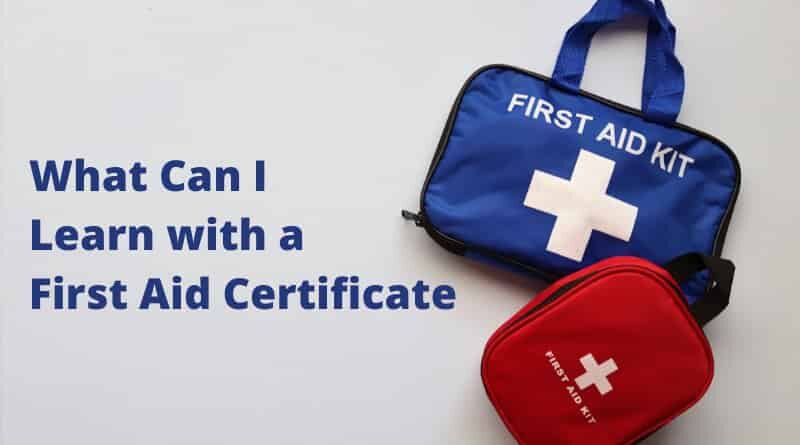What Can I Learn with a First Aid Certificate?
Most of us have heard of First Aid and earning your First Aid certificate, but what does this involve?
Here, we’re taking a closer look at First Aid certification courses and the many skills you can gain from these programs. We walk through the different types of injuries and emergencies that First Aid can respond to and details some reasons why you should certainly consider learning First Aid. Now that you can take 100 percent online First Aid training classes, it’s never been easier to learn these skills.
Table of Contents
WHAT IS FIRST AID?
According to the Save a Life initiative, First Aid refers to the “emergency or immediate care you should provide when a person is injured or ill until full medical treatment is available.” If the wound is minor (such as a small cut or bruise), First Aid may be sufficient for treating the victim. However, in most cases, First Aid is designed only as a temporary measure to keep the victim stable until they can access medical personnel.
WHY IS FIRST AID TRAINING IMPORTANT?
While it makes sense for nurses, doctors, and those in the medical field to receive First Aid training, we believe that everyone could benefit from First Aid certificate. You never know when a medical emergency will strike. More likely than not, the victim of an emergency will usually be far from a hospital or professional medical care. This is when a bystander (trained and certified in First Aid) can make a major impact.
By providing First Aid, you can save lives. Let’s use cardiac arrest as an example. If someone suffers from cardiac arrest and doesn’t immediately receive CPR, their survival rate plummets. In fact, for every minute that passes without CPR or some type of First Aid, the victim’s mortality rate increases by 10 percent. By being trained in CPR and other forms of First Aid, you can potentially be the difference between life and death for someone experiencing a medical emergency.
In addition to saving lives, learning First Aid can also make you a more confident, secure person. Those around you will be comforted that you can provide fundamental First Aid, and your household will become a safer place.
Read: Health Coach Certification
WHAT CAN I LEARN WITH A FIRST AID CERTIFICATE?
Most types of medical training are pretty straightforward. In a CPR certification course, you’d expect to learn CPR. But since First Aid covers so many different kinds of injuries and ailments, what exactly do you learn from a First Aid certification class?
Here’s a look at just what you’ll learn through First Aid training:
- First Aid basics: before diving into specific emergencies and responses, a First Aid training course will cover the basics, including instruction on assessing the scene of an emergency before taking action safely.
- Breathing and choking emergencies: any respiratory problem (including choking) that can threaten a victim’s life is considered a breathing emergency. These emergencies include asthma, allergic reactions, heart attacks, an infection like pneumonia, or an injury to the chest or lungs.
- Allergy emergencies: in some cases, when a person comes into contact with an allergen (a bee sting or a specific type of food, for example), they will go into anaphylactic shock. Anaphylaxis can obstruct the airway, cause the person to go into shock, and even prove fatal. First Aid training teaches you how to recognize this condition and how to use an EpiPen safely.
- Nervous system emergencies: seizures, heart attacks, spinal and head injuries, and strokes are all medical emergencies that affect the nervous system. First Aid training includes instruction on how to safely and effectively deliver CPR (both traditional and hands-free CPR) to respond to these emergencies.
- Bites and sting emergencies: while these might seem like minor injuries, a bite or sting can become infected or cause an allergic reaction. First Aid training guides you through treating animal bites and stings from various insects, including bees, wasps, and jellyfish.
- Heat and cold-related emergencies: exposure to extreme heat can lead to various medical emergencies, such as dehydration, cramps, or heat stroke. Additionally, exposure to cold temperatures can develop into frostbite or hypothermia. First Aid training helps you respond to both extremes.
- Wound emergencies: First Aid training prepares you to treat both open and closed wounds, including instruction on how to stop the bleeding, apply pressure, and how to make a bandage.
- Burn emergencies: whether caused by heat, an open flame, chemicals, or an electrical shock, burns can be extremely painful. First Aid can train you to respond to first degree, second degree, or third-degree burns. In some severe cases, you may even need to provide CPR to the burn victim.
- Poison emergencies: poisons may be ingested deliberately or accidentally and cause illness, injury, or even death. Whether the poisoning is caused by drugs, alcohol, plants, pesticides, or even foods, First Aid training will teach you what to do in the event of a poisoning emergency.
Read: Advanced Practice Career Options for Nurses
ONLINE FIRST AID CERTIFICATION
Nowadays, what can’t we do online? If you’re interested in learning vital First Aid skills without dealing with the hassle of in-person classes, you’re in luck. Many programs now offer 100 percent online First Aid classes and certification. This means that you can receive professional and comprehensive First Aid training without ever leaving the comfort of your home.
With online First Aid certification, all you have to do is register for your course, pass the final test, and print off your proof of certification. It’s that fast and easy. Plus, since these classes are online, they’re designed to fit your schedule and learning pace. Start or stop any lesson at any time and pick right back up where you left off.
CONCLUSION – WHAT DO I LEARN WITH A FIRST AID CERTIFICATE?
You never know when an emergency will strike you or a loved one. This is why, in many cases, learning First Aid is your best defence. First Aid training can prepare you to respond to various medical emergencies, such as burns, open wounds, poisoning, or breathing emergencies. Now that you can enrol in a First Aid class online, there’s never been a better time to gain these essential, life-saving skills.




